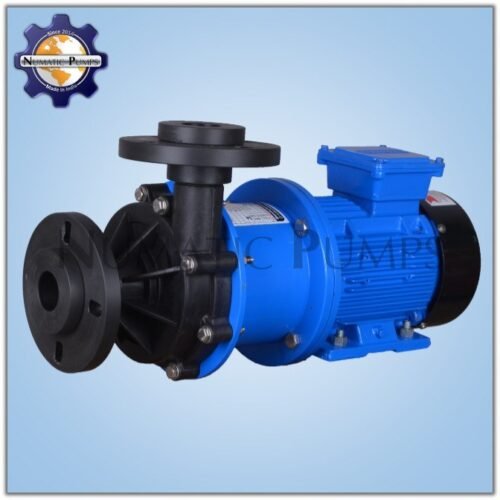PP Magnetic Pump NP-650

● Pump Type – Centrifugal, Magnetic Drive, Non Self Priming Pump
● Pump Material – PP (Polypropylene)
● Shaft – Ceramic
● O’Ring, Bush & Bearing – Viton, GFT (Glass filled Teflon), Carbon
● Media – Diluted Acidic Solution
● Max Liquid Density – 1.3
● Max Head – Upto 34 Meter
● Max Flow – 620 Leter per Minute
● Inlet & Outlet – 50 mm x 40 mm (Flanged end Connection)
● Motor Specification – High Power Permanent Rare earth Magnets
● Magnet – 5 HP, NFLP, 2800 RPM, 50 Hz, 3 Phase.
● Fluid Temperature – 70° C (Max)
● Seal Type – Sealless
● Impeller – Closed Type
Our range of PP Magnetic Drive Pumps
Sealless Pumps
Sealless pumps are centrifugal pumps that don’t have the dynamic mechanical shaft seal that typically seals the pump shaft. To produce a totally sealed liquid end or pressure boundary, this dynamic seal is replaced with a static containment shell. Drive by Magnets Sealless Pumps feature a unique sealless design that allows them to pump caustic and hazardous substances without worrying about leakage or emissions. The whole Sealless Pump is made up of only three components: the front casing, the impeller, and the back cover. The construction is relatively simple and requires very little maintenance, resulting in cost savings in terms of repair and spare components during the pump’s lifetime.
An ordinary mechanical pump using a mechanical seal has the drawback of getting worn out due to friction or wear and tear over continual use. This leads to a safety risk as hazardous chemicals may leak into the outside environment. Sealless pumps overcome this drawback by completely enclosing the wet-end of the pump. This eliminates the need for a seal and makes sealless pumps the ideal choice for systems dealing with hazardous liquids such as toxic chemicals, acids and other volatile compounds.
Sealless Pumps Properly designed, applied and operated may offer the following advantages:
• Increased safety while working with flammable substances
• During normal operation, leakage was eliminated due to primary containment.
• Secondary confinement as a backup option
• Preventing precious liquids from being lost.
What is Sealless Pump and how does it work?
Sealless Pump is a conventional centrifugal pump without the Mechanical Seal that would normally be used to seal the pump shaft. Now, this Mechanical Seal is replaced by a static containment shell to form a completely sealed Pump. With the use of rare earth magnets such as samarium cobalt, the magnets are much smaller and more efficient, leading to the units being more economically feasible.
Sealless pumps are divided into two categories.
Canned Motor Sealless Pumps
The Canned Motor sealless Pump is made up of a centrifugal hydraulic pump that is linked to a specific motor through a one-piece assembly. The liquid is contained in the rotor chamber by the stator being sealed in the air gap. The pumped liquid cools the motor and lubricates the sliding bearings that support the rotor as it rotates through the rotor chamber. The chamber’s shell creates a sealless enclosure that keeps the liquid contained without any dynamic sealing.
Magnetic Drive Sealless Pumps
In a magnetic drive sealless pump the impeller and the pumped fluid are both enclosed within a completely sealed container. The motor’s driving shaft turns a magnet assembly on the exterior of the housing. On the interior of the housing, a similar ring of magnets on a shaft connecting to the impeller stands in opposition. Because of the linked magnets, torque is passed through the housing. Because there is no direct connection between the electric motor shaft and the impeller in magnetic drive pumps, no seal is required. Unless the sealless pump casing is cracked, there is little chance of leaking. In a Sealless Pump, the shaft from the motor is connected to an outer magnet carrier. Inside the Sealless Pump, there is a containment shroud, and inside of that containment vessel is another shaft, which is not the same as the shaft connected to the motor. This shaft inside the containment shell is connected to the impeller, and inside the shroud is another magnet. So the outer magnet in the carrier is connected to the motor, and when it spins, the magnetic forces go through the containment vessel to the inner magnet, which is attached to a shaft that is attached to the impeller to rotate the shaft. Sealless Pumps keep People and the Environment safe. Sealless Pumps typically Pump hazardous materials that may sometimes be considered Environmental Contaminants, making zero-leakage sealless pumps excellent for employees and the environment. Sealless Pumps, on the other hand, can operate for 2 to 3 years without maintenance, unless bearings need to be replaced.
